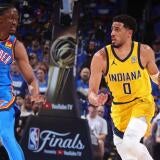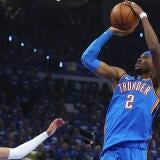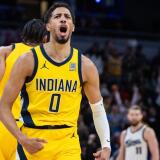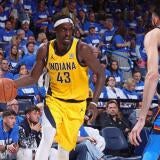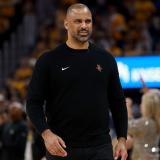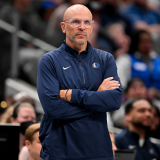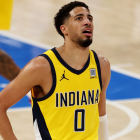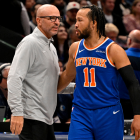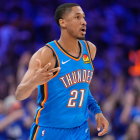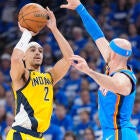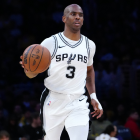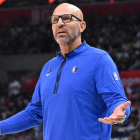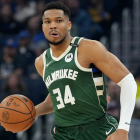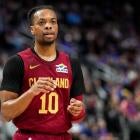
Is Nikola Jokić the greatest MVP runner-up of all time? Nuggets star among elite company in NBA history
Jokić just had arguably his best season, and one of the best statistical seasons ever
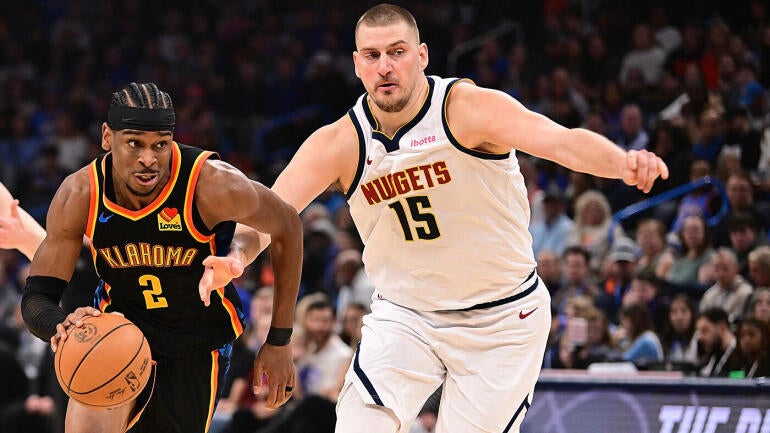
Shai Gilgeous-Alexander has been voted the 2024-25 NBA MVP, according to ESPN, and obviously, that means Nikola Jokić was not. Whether Jokić or Gilgeous-Alexander was the proper choice was a matter of intense debate throughout the season, but what largely wasn't up for debate was where Jokić's season compared to his own prior performances. Despite winning three of the past four MVP awards, on paper, Jokić had what is widely considered to be his best NBA regular season.
This season, Jokić set new career highs in points, assists and steals per game. He topped 40% from 3-point range for the first time this season, and he did it with the second-highest 3-point attempt rate of his career. He set new career-best marks in a number of all-in-one metrics, including Offensive Box Plus-Minus and Offensive Win Shares. In several others, he flirted with career-best marks or led the league without setting his own personal high. The Nuggets were a staggering 19.8 points per 100 possessions worse with him on the bench this regular season. With him on the court, they had the best offense in NBA history. With him on the bench, they would have ranked dead last on this season's leaderboard.
The voters made their pick. As a group, they preferred the season that Gilgeous-Alexander had. But put Gilgeous-Alexander to the side for a moment here. In a vacuum, this is a top-15 player in NBA history at the absolute peak of his powers. In the absence of a similarly iconic challenger, you'd probably assume such players always win MVP.
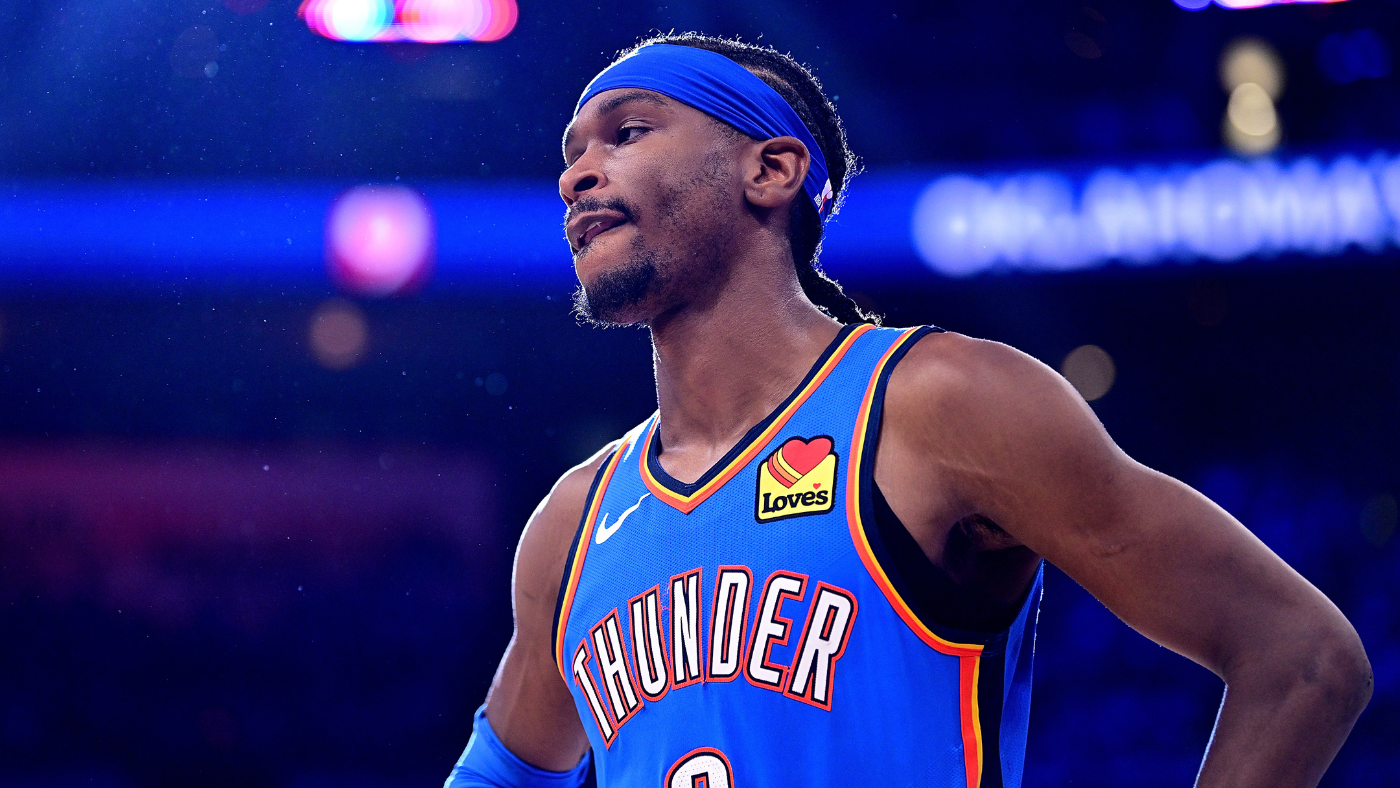
The reality is that they don't. Derrick Rose beat a 27-year-old LeBron James. That deprived him of a streak of five consecutive MVPs he probably deserved. Michael Jordan was, somewhat emphatically, the best player in the world between 1988 and 1998. He won five MVPs in that stretch, but he also lost four. Jokić has already experienced this phenomenon to an extent. Joel Embiid won the 2023 MVP over him in a race that has aged quite poorly. Voter fatigue is a fairly verifiable phenomenon. The mere concept ensures that every all-time great has a few historic seasons that ultimately weren't recognized with a trophy.
So this raises another interesting question: what is the best season ever that didn't end with an MVP award? Did Jokić just have it? We'll make the case below before choosing the greatest MVP runner-up (or, perhaps, down-ballot finisher) of all time.
The case for (and against) Jokić
Let's start with the obvious: Jokić averaged a triple-double. Averaging a triple-double is not an inherently meaningful measuring stick, but it's exceedingly rare. There have only been six seasons in NBA history in which someone has averaged one: Oscar Robertson did it once and Russell Westbrook did it four times. Oddly enough, 2017 Westbrook is the only one out of those six seasons to win MVP, so any other triple-double season is theoretically competition for him. I say "theoretically" because in truth, Jokić blows Westbrook and Robertson out of the water.
Among the triple-double seasons, Jokić leads Westbrook and Robertson in basically every all-in-one metric. He was significantly more efficient than Westbrook or Robertson as well. Both Robertson and Westbrook, in their best triple-double seasons, had a true shooting percentage of 55.4%. Jokić's true shooting percentage was 66.3%. That number doesn't quite do him justice. Jokić leads the league in heaves every year. This year, he took 22 of them and made two. Remove those heave attempts and his 3-point percentage jumps just above 44%. His willingness to take low-percentage shots on the off-chance they'll go in was the difference between him ranking 18th in 3-point percentage this season and ranking third.
Speaking of things Jokić ranks in the top three of: he just became the first player to ever finish in the top three in the NBA in points, rebounds and assists per game. He also tied for No. 5 in steals, meaning blocks are the only one of the five major individual statistics in which he did not rank in the top five. Ironically, blocks are a center-centric statistic and Jokić is a center. Statistically, though, he looks more like a point guard. As we've covered Westbrook and Robertson, you won't be surprised to hear that Jokić was the first center ever to average a triple-double. He is also the first center ever to reach 10 assists per game. In fact, Domantas Sabonis and Wilt Chamberlain are the only other centers to even reach eight assists per game.
Let's take a look at some of the all-in-ones metrics:
- Jokić just had the 14th-best season in NBA history by Value Over Replacement Player. Six players who did not win MVP are ahead of him: 1994 David Robinson, 2009 Chris Paul, and four separate Michael Jordan seasons (1987, 1989, 1990 and 1993).
- Jokić just had the 13th-best season in NBA history by Win Shares per 48 Minutes. Only two players who did not win MVP are ahead of him: 1964 Wilt Chamberlain and 1973 Kareem Abdul-Jabbar (the worst MVP snub ever!)
- Jokić just had the fourth-best season in NBA history by PER. Only two players who did not win MVP are ahead of him: 1962 Wilt Chamberlain and 2022 Giannis Antetokounmpo.
- Jokić just had the second-best season in NBA history by Box Plus-Minus. The only player to beat him was his 2022 self, who won MVP.
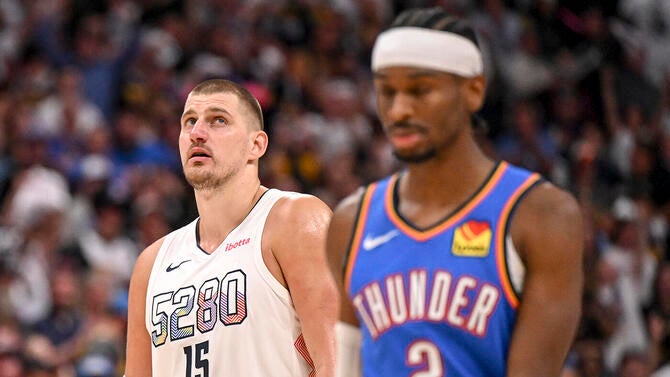
Now, you might be wondering why I bothered sharing the first three metrics if Jokić wasn't the non-MVP leader in each of them. Take a look at who's ahead of him. None of those names repeat. All of these metrics take slightly different approaches to measuring value. What they have in common is that Jokić is near the top of all of them. That's exceedingly rare, and we can use this year's MVP, Gilgeous-Alexander, as an example to prove it. Gilgeous-Alexander actually slightly edged Jokić out in Win Shares per 48 minutes to rank 10th all-time in that metric. However, he ranked 33rd in VORP and 25th in PER. Both are, obviously, tremendous achievements, but it just goes to show that the things each all-in-one metric measures are slightly different, so to make it into the top 14 for four different ones suggests that the player in question is affecting the game in a nearly impossible amount of ways.
Speaking of which, as we mentioned above, Denver was 19.8 points per 100 possessions worse when Jokić went to the bench. With him, their net rating would have ranked second in the NBA over the full season. Without him, it would have ranked 28th. This sort of gap is obscenely high, but comparing individual seasons on this basis probably isn't worthwhile because of all the context involved. His competition shouldn't be punished for having decent benches. Still, Jokić has never played with an All-Star and his bench is awful every year. That didn't change this season.
In total, the Nuggets scored 9,902 points this season. Jokić scored 2,071 of them and assisted on another 1,850. He directly generated 39.6% of his team's points. Gilgeous-Alexander, by comparison, was at 38.1%. That gap might not seem significant, but remember, we're talking about every single point a team generated over a full season. The difference is big, and we're comparing him to an MVP winner.
So let's compare him directly to MVP winners just to emphasize where he stands:
- Jokić's 29.6 points per game would rank 20th among all MVP winners.
- Jokić's 12.7 rebounds per game would tie for 30th among all MVP winners, but if you sort out the pre-merger MVPs, it would tie for 11th.
- Jokić's 10.2 assists per game would rank seventh among all MVP winners.
- Jokić's true shooting percentage of 66.3% would rank second among all MVP winners.
Essentially, what this says is that Jokić was an above-average scorer by MVP standards in terms of volume, but he maintained absolutely historic efficiency and playmaking despite that scoring workload. When you add all of this together, you're talking about potentially the greatest offensive season in NBA history.
If you're looking to poke holes, that's where you'll find the biggest. This was a historic offensive season and a so-so defensive season. Jokić's defense is a topic of hot debate. Metrics tend to be relatively supportive. The eye-test usually is not. What we can say, at the very least, is that this was not a good Jokić defensive season. His coach spent months harping on defensive execution in press conferences before getting fired. Denver's defense ranked 21st in the regular season. Even the numbers that like him do so less than they usually do. He led the NBA in Defensive Box Plus-Minus in each of the past three seasons, never dipping below +4.2. This season, he fell to +3.3. You can find similar declines in basically every metric.
There's also team performance to consider here. We covered the deficiencies in his supporting cast, but 50 wins is still relatively pedestrian at the level we're talking about here. That's part of what cost him this year's MVP to Gilgeous-Alexander. How much you value winning in the context of individual performance is subjective, but when we're arguing about where a player falls in any all-time sense, record has to at least be addressed.
Who's the competition?
We mentioned 1962 Wilt Chamberlain above, and that's the logical starting point because... you know... he averaged 50 points per game. Does the conversation end right there? Well... probably not. In 2020, Tom Haberstroh looked at the best individual scoring seasons in NBA history for NBC Philadelphia and noticed that most of them happened to come in the 1960s or early 1970s. Were scorers better back then? Of course not. The game was just much, much faster. When he adjusted for pace, he actually found that Kobe Bryant, who scored 35.4 points per game during the 2005-06 season, was actually the most impressive volume scoring season ever. The 2005-06 season had the fifth-slowest pace on record. Exact paces were not measured until 1973. However, the average NBA game featured 79 field goal attempts in 2006. In 1962, it was 107.7.
Does this eliminate Chamberlain? Absolutely not. Remember, the downside to playing at that pace was that it was likely, frankly, exhausting. If anything, the more impressive Chamberlain stat from that season is that he averaged 48.5 minutes per game. I'll remind you here that a basketball game is only 48 minutes. Chamberlain spent only eight total minutes on the bench that season, but because he had games go to overtime, he was able to average more than 48 per appearance. That is a feat that will truly never be matched, and it keeps him in the race here.
What about that Bryant season? It probably deserves a look, too, especially since Bryant paired that historic scoring with a First-Team All-Defense nod. The catch here is that while Bryant scored a lot of points, he didn't do so especially efficiently. The average effective field goal percentage for the 2005-06 season was 49%. Bryant's was 49.1%. Compare that to Jokić and the gap here is vast. The average effective field goal percentage this season was 54.3%. Jokić's was 62.7%. Bryant was never known for his playmaking, but this was an especially poor season for him in that regard. The 4.5 assists he averaged per contest were the fewest he ever posted between his first championship season in 2000 and his last in 2010. Ultimately, the metrics are firmly in Jokić's camp. Bryant's 2005-06 season would not rank in the top five of Jokić's career in terms of any of the all-in-one metrics we've covered thus far. Bryant did a lot to carry a bad supporting cast, but he's probably a hair below the Jokić tier here.
How have we made it three paragraphs without saying the name "Michael Jordan?" Picking even the single best non-MVP Jordan season is going to be a challenge. Think of the metrics we covered above. Jordan has three separate non-MVP seasons in which he led the NBA in all of them: 1989, 1990 and 1993. He nearly did so again in 1997, coming short only in PER, but also winning 69 games. It's a tough call, but the answer here is probably 1989. It was the season out of the four in which he won the least, but if Jokić makes the list with 50, we're not discrediting Jordan with 47.
So, what makes 1989 Jordan so incredible? Buckle up, folks. To this day, Jordan is the only player ever to lead the NBA in both points per game and Defensive Box Plus-Minus, and as a reminder, he's a guard. Leading the NBA in any all-in-one defensive metric without blocking shots is incredible. Jordan did it while also being the NBA's best offensive player. He averaged career-highs in both rebounds and assists at exactly eight per game. What is largely forgotten about this specific Jordan season is that he played point guard down the stretch. He even flirted with a triple-double average in March and April, when Doug Collins fully made the switch. Throw in 2.9 steals per game, his typically strong efficiency and the fact that this was the last season before Scottie Pippen emerged as an All-Star and you have a season that remains to this day among the very best in NBA history, with or without an MVP award.
We've covered one GOAT candidate. What about the other? Well, here's a surprising answer: there really isn't a LeBron James season that fits the bill here. His four best regular seasons, pretty comfortably, were his four MVP seasons. We mentioned the 2010-11 season in the middle of that stretch in which he lost to Rose, but while he still probably should have won the award, it was easily his worst season in that stretch by almost any measure. That makes sense. He was adjusting to his newly formed super team. There were natural growing pains.
If there is a candidate here, it would be his 2007-08 season, the last before he started winning MVPs. James won his lone scoring title with 30 points per game, and he led the NBA in several major metrics. This version of LeBron just trails 1989 Jordan on basically every front. It was generally quite rare for Jordan to out-rebound and out-assist any version of James, but that's the case here. Jordan was more efficient. He won more games. He was better in most of the all-in-ones. There's just not a real debate between these two, specific vintages, at least in the regular season.
That's the last key point where James is concerned. While voter fatigue exists, it's not the reason James stopped winning MVPs. He just stopped taking the regular season as seriously as he used to. James has led the NBA in VORP only once since winning his last MVP, and that was in 2018, when he played all 82 games. That's the only metric we've covered in which he's led an NBA regular season since 2013. But when the playoffs come? He's MVP-caliber LeBron again. You could credibly argue that 2018 playoff LeBron James is the single highest peak any basketball player has ever reached... that's just not what we're measuring here. So LeBron is out.
That covers most of the obvious candidates, but there are plenty more that merit mention:
- James Harden in 2019. He outscored 2006 Bryant in raw points (36.1 per game), but that total is less impressive with pace factored in. However, the thought of someone leading the NBA in both 3-pointers and free throws felt downright impossible before Harden did it three times in a row. Harden won MVP in 2018, but some of the all-in-ones actually favor his 2019 campaign. But the Rockets were worse and Harden doesn't really defend. Antetokounmpo came onto the scene and (fairly) won MVP, so this Harden season gets lost to history.
- Chris Paul in 2008. Do any historical deep dive on numbers and you're going to come away thinking Chris Paul is one of the most underrated players of all time. Bryant won this MVP, but Paul should have. He led the NBA in assists and dished out an estimated 52.2% of his team's assists while he was on the floor. He led the NBA in steals, was named First-Team All-Defense and finished seventh in Defensive Player of the Year voting as a six-foot point guard. He led the league in Win Shares per 48 minutes with the 32nd-highest mark in league history in that stat. He won 56 games with David West as his best teammate. The history books may not appreciate Chris Paul, but you should.
- Shaquille O'Neal in 2001. The raw stats are only a tiny drop off from his 2000 MVP season, which is widely regarded as one of the best in NBA history. How he lost MVP to Allen Iverson is one of history's great mysteries. Where he struggles on a list like this is with the advanced metrics. His raw numbers are similar to where they were in 2000, but his all-in-ones declined meaningfully.
- David Robinson in 1994. He's taken a lot of heat for his 1995 win over Hakeem Olajuwon, but ironically, he really should have beaten the Dream in 1994. This is the lost great statistical season in NBA history. It ranks fourth all-time in VORP, 11th all-time in Box Plus-Minus, 18th in Win Shares per 48 minutes and 24th in PER. He won the scoring title and finished second in Defensive Player of the Year. The Spurs won 55 games despite having only three other players average in double figures. His highest-scoring teammate was a 33-year-old Dale Ellis at 15.2 points per game, yet San Antonio ranked fourth in the NBA in offense with Robinson leading the team in assists as a center. IBM used to hand out its own MVP award based solely on statistics. It was discontinued in 2002, but Robinson won it five times. Jordan, by comparison, won twice. This year was Robinson's opus.
- Larry Bird in 1987. He won three straight MVPs in the three seasons that preceded 1987, but there was no real drop-off afterward. This was actually his best season by Box Plus-Minus and his second-best season by VORP and Win Shares per 48 minutes. He led the NBA in 3-point attempts on 40% shooting, and this was the only season in which he averaged at least 28 points, nine rebounds and seven assists. Bird got three trophies for a five-year run of absolute dominance. He didn't win MVP in 1987 or 1988, but he easily could have. The slight edge goes to 1987, but either is a credible candidate.
- Kareem Abdul-Jabbar in 1973. The fourth-greatest season ever by Win Shares per 48 minutes, and the league leader in basically every advanced metric for the 1972-73 season. Players voted for MVP back then, and they bizarrely chose Dave Cowens, but this was the third-best player of all time still in his early athletic prime.
So, who's the best non-MVP ever?
We can broadly divide the players we've covered into two tiers. There's an obvious top three, though the order within it isn't nearly as clear, and then everyone else is fighting to round out the top five. So, without further ado, here is how I would rank the five best non-MVP seasons in NBA history:
5. 2019 James Harden
This was ultimately a battle between 2019 Harden and 2006 Bryant. In the end, Harden won by a hair. Bryant's total scoring in what we now know to be the NBA's dead-ball era was incredible, but says more about the era than him. Allen Iverson scored 33 points per game in this same season. Gilbert Arenas averaged 29.3. Bryant-esque one-on-one scorers dominated this era. He was the best of them, but he wasn't a one-on-one to the degree that Harden was. Harden scored 649 more points than any other player in basketball. No one came within eight points per game of him. That he was also a far better playmaker than Bryant and won 53 games despite a quietly shaky supporting cast (Paul got hurt and struggled, Trevor Ariza left for nothing, Carmelo Anthony lasted 10 games) won him the nod.
4. 1994 David Robinson
If Tim Duncan or Shaquille O'Neal had posted this season, it would be widely regarded as one of the great statistical years in NBA history. We tend not to regard Robinson quite as reverentially, though, so it's gotten lost. It checks every box. Robinson was great at practically everything. Every metric adored him. This is the best regular season any Spur has ever had. Better than Robinson's 1995 MVP or either of Duncan's. It just doesn't have quite the same historical significance as the next three.
3. 1962 Wilt Chamberlain
We'll never see 50 points per game again. We just have to apply proper context. This came in an eight-team league. Bill Russell was the only person in the league with a prayer defensively against Chamberlain at this point. The pace inflated offensive numbers. It's still a remarkable achievement, especially for Chamberlain's endurance. It just isn't quite the unimpeachable statistical marvel it looks like on first glance. You could imagine another all-time great approaching Chamberlain's numbers if he plopped into the 1962 NBA. It's much harder to see other players replicating what the next two players accomplished.
2. 2025 Nikola Jokić
Greatness isn't even the proper lens with which to judge Jokić. There are a lot of great players. Jokić is in a more exclusive club. He has fundamentally challenged our preconceived notions about what is possible on a basketball court in a way that very, very few players ever do. This century, only James (by capably playing all five positions) and Stephen Curry (through his shooting, and perhaps just as importantly, his off-ball movement) can truly say the same.
Jokić is the league's best passer at the position that typically offers the least passing. He was just among the league's best shooters at the position that typically offers the least shooting. He's mastered these atypical traits while also being the best player in the sport at most of the things his position is supposed to do well. There is not a more dangerous scorer with his back to the basket than Jokić. There are few superior rebounders. And this is the best version of him yet. He is quite possibly the most powerful offensive force the NBA has ever seen. Of course, we had to qualify that last statement with the word "offensive." Jokić's defense is his lone drawback, and our No. 1 pick has no such limitation.
1. 1989 Michael Jordan
If you believe that Michael Jordan is the greatest basketball player that has ever lived, and most people do, your arguments probably start with his 10 scoring titles, five MVPs and 6-0 Finals record. Those things all matter, but they're all context-dependent. Would LeBron James have won more championships or MVPs if he'd played on the Bulls in the 80s and 90s? We really don't know, just as we don't know how Jordan would have fared in LeBron's shoes. You're not really debating a player's merits when you just list accolades.
The debate between Jordan and James, on a basketball level, is about weighing versatility against peaks. James, due to a combination of his physical attributes and his mindset, was great at more things than Jordan. But Jordan was better at the things he was great at, most notably scoring, than James was. What you prefer in a player will inform who your GOAT is, but if you're looking for a reason to pick Jordan, this season is arguably the best piece of evidence you have because it's the firmest proof that exists suggesting that, if Jordan had wanted to, he could have played the way that James does. He could have been a point guard and a consistent triple-double threat.
Robinson was great at everything in 1994. Jordan was a level beyond that in 1989. He showed that when he wanted to master a skill, he might truly be capable of being the best player in the NBA at practically anything. He led the league in scoring. He competed for a second Defensive Player of the Year. He passed like a point guard and rebounded like a power forward. It wasn't the best Jordan we ever saw, but it was by far the most versatile, and therefore a meaningful data point in his case to remain ahead of James, the most versatile player in NBA history. For a non-MVP season to factor prominently into what is quite possibly the single most consequential debate in the entire sport says everything you need to know. There will likely never be a better season in NBA history that does not end with the appropriately named Michael Jordan trophy.
![[object Object] Logo](https://sportshub.cbsistatic.com/i/2020/04/22/e9ceb731-8b3f-4c60-98fe-090ab66a2997/screen-shot-2020-04-22-at-11-04-56-am.png)


